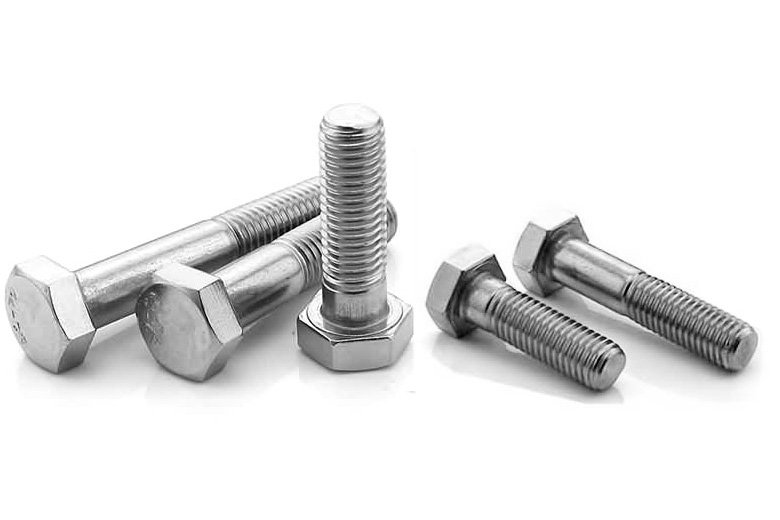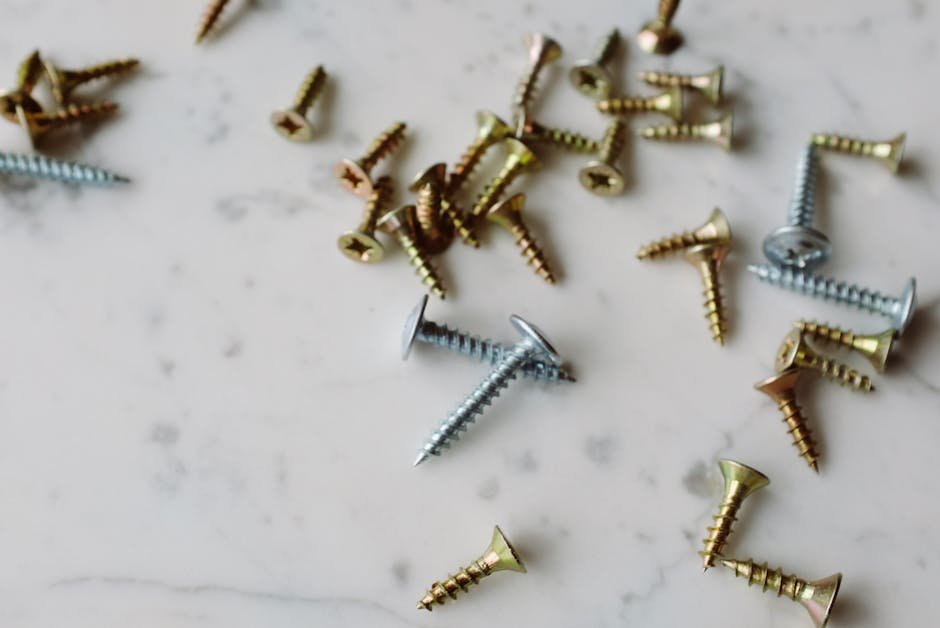What Material is Used for High Strength Screws?
When it comes to high strength screws, the material selection is paramount. It’s like choosing the right superhero for the job—each material comes with its own superpowers. Let’s dive into the materials that make these screws stronger than your morning coffee.
Alloy Steels: The Primary Material Used for High Strength Screws
Alloy steels are the heavy lifters in the fastener world. These materials are typically employed in grades such as 8.8, 10.9, and 12.9, each offering varying degrees of tensile and yield strength. For instance, a Grade 8.8 screw can withstand a minimum tensile strength of 800 MPa, while Grade 12.9 takes it up a notch to 1200 MPa.
The secret to alloy steel’s strength lies in heat treatment—specifically, quenching and tempering. This process improves the screw’s durability, making it a go-to for structural applications. As we often say in the industry, “For fasteners and fixings, high tensile steel is some of the best material on offer.”
For more details about our stainless steel bolts, check out our Stainless Steel Bolt options.
Stainless Steel: A Key Material in High Strength Screws
Stainless steel is like the Swiss Army knife of fastener materials—versatile, durable, and resistant to corrosion. Grades like 17-4 PH and BUMAX 88 and 109 are renowned for their high performance in corrosive environments, thanks to a nifty process called precipitation hardening.
This material finds its calling in marine and chemical industries where exposure to harsh conditions is routine. If you’re curious about different stainless steel designs, our Flat Socket Bolt is worth exploring.
Titanium and Other Materials Used for High Strength Screws
If alloy steels are the heavy lifters, then titanium is the sleek, agile gymnast. Known for its high strength-to-weight ratio, titanium is a favorite in aerospace and medical applications. It’s like having the strength of a heavyweight in the body of a lightweight.
But it’s not just titanium in the spotlight. Advanced polymers and ceramics also play roles in niche applications, offering unique properties like temperature resistance and electrical insulation. Each of these materials has its own strengths and limitations, making them suitable for specific uses. Explore our Allen Bolts to see titanium in action.
Comparing Tensile and Yield Strengths of Different Screw Materials
When it comes to figuring out what material is used for high strength screws, two terms pop up a lot: tensile strength and yield strength. Think of them as the superheroes of strength metrics, each with its own power.
Here’s a quick look at how these materials measure up:
-
Alloy Steel is a powerhouse, boasting a tensile strength between 800-1200 MPa and a yield strength of 640-1080 MPa. It’s the sturdy choice when you need something that can handle a hefty load.
-
Stainless Steel isn’t far behind. It offers tensile strength ranging from 700-1000 MPa and a yield strength of 450-900 MPa. It’s like the reliable friend who’s always there when conditions get tough, thanks to its awesome corrosion resistance.
-
Titanium, the lightweight champ, shines with a tensile strength of 900-1200 MPa and a yield strength of 830-1100 MPa. It’s perfect when you need strength without the bulk.
While alloy steel leads the pack in pure strength, titanium offers a neat combo of robustness and lightness. But don’t forget about the magic of heat treatment. This process, with steps like quenching and tempering, can make these materials even stronger.
The Role of Heat Treatment in Enhancing Screw Strength
Heat treatment is like a magical makeover for metals. It’s what turns regular screws into high strength fasteners. Through processes like quenching and tempering, metals become tougher and more durable. For stainless steel, precipitation hardening is a game-changer. It boosts hardness and strength, especially in materials like 17-4 stainless steel.
For more detailed information about 17-4 stainless steel and its properties, check out this Wikipedia article on 17-4 stainless steel.
How Environmental Factors Impact Screw Performance
Environment plays a sneaky role in screw performance. Temperature swings can weaken some materials or make others brittle. That’s where coatings and platings come in, acting like armor against corrosion and wear. At Auxbolts, our Hex Bolts are built to face these challenges head-on, providing reliable performance even in the toughest conditions.
Applications Where High Strength Screws are Essential
High strength screws are the unsung heroes of many industries. Picture them as the silent superheroes holding together the frameworks of automotive marvels, the towering structures in construction, the soaring wings of aircraft, and the robust engines of heavy machinery. They work tirelessly behind the scenes, ensuring everything stays where it should.

The Importance of Material Choice in Specific Applications
Choosing the right material for these mighty screws is crucial. It’s like picking the right gear for a mountain hike—you need something that won’t give up under pressure. In demanding environments, such as the salty air of a marine setting or the intense pressure of an industrial machine, the screw’s material must stand up to these challenges.
Load requirements and fatigue resistance are also critical. You wouldn’t want a screw that gives up halfway through its job, would you? That’s why select a material that matches the demands of the application. At Auxbolts, we offer a variety of options that cater to these needs. Check out our Button Head Socket Screws for diverse applications.
By understanding the specific requirements of each application, you ensure the longevity and effectiveness of your fasteners. So, next time you’re considering what material is used for high strength screws, the right choice can make all the difference in your project’s success.
Engineered Polymers, Ceramics, and Metals: A Comparison
When thinking about what material is used for high strength screws, metals often steal the spotlight. But let’s not overlook the charming underdogs—engineered polymers and ceramics. They might not flex their muscles like metals do, but they bring their own flair to the table.
Metals, like alloy steel and titanium, are the bodybuilders of the screw world. They offer unparalleled strength and durability. But engineered polymers come in as the lightweights with a twist—they provide electrical insulation and are resistant to some chemicals. Imagine them as the nimble gymnasts who excel in flexibility and adaptability.
Ceramics might sound fragile, but they have a trick up their sleeve. Their resistance to high temperatures and corrosion makes them ideal for applications where metals might falter. Think of them as the zen masters, maintaining their cool even under pressure.
In a nutshell, while metals are usually the go-to for sheer strength, engineered polymers and ceramics shine in environments where unique properties like temperature resistance and electrical insulation are required. Choosing the right material depends on what you need the screw to achieve. And at Auxbolts, we’ve got you covered with a range of options to suit any need.
Frequently Asked Questions about High Strength Screw Materials
What is the Strongest Material for Screws?
When it comes to raw power, alloy steel often comes out on top. It’s the tough guy in the room, ready to handle heavy loads without breaking a sweat. But let’s not forget titanium, the lightweight champion. It offers comparable strength with the bonus of being easy to handle. Meanwhile, stainless steel quietly excels in places where corrosion resistance is the name of the game. So, the strongest material for screws really depends on what you need them to do.
How Do Coatings Improve Screw Properties?
Think of coatings as a superhero cape for screws. They add an extra layer of protection against the villains of corrosion and wear. Zinc plating and galvanization are popular choices, especially when screws are destined for outdoor or marine environments. These coatings help screws last longer and perform better, even under tough conditions.
What Material is Best for High Strength Fasteners?
Choosing the best material is like picking the right tool for the job. Alloy steel shines when the screws need to bear heavy loads. If the environment is harsh and full of moisture, stainless steel is your best bet. And when you need strength without the weight, titanium steps up. In many cases, yield strength—the ability to withstand permanent deformation—can be more important than tensile strength. So, always match the material to the specific demands of your application.
At Auxbolts, we understand the importance of choosing the right material for high strength screws. With our 16 years of expertise, you’re in good hands when navigating these decisions.
Conclusion

Choosing the right material for high strength screws is more than just picking a name off a list—it’s about setting the stage for success, durability, and peace of mind. Whether you’re building bridges or assembling aircraft, the core strength and resilience of your fasteners can make all the difference.
At Auxbolts, we understand that the stakes are high. With 16 years of expertise, we specialize in crafting hardware that meets the diverse needs of industries far and wide. Our focus on precision engineering ensures that each bolt, screw, and nut delivers exceptional performance. Plus, our advanced coatings are like a suit of armor for your fasteners, offering superior corrosion resistance.
For those curious about our offerings, our Stainless Steel Bolts are a testament to our commitment to quality.
In the end, selecting the right material is not just about today—it’s an investment in the future. Trust Auxbolts to provide the reliable, customized solutions you need, because when it comes to hardware, we’ve got you covered.



